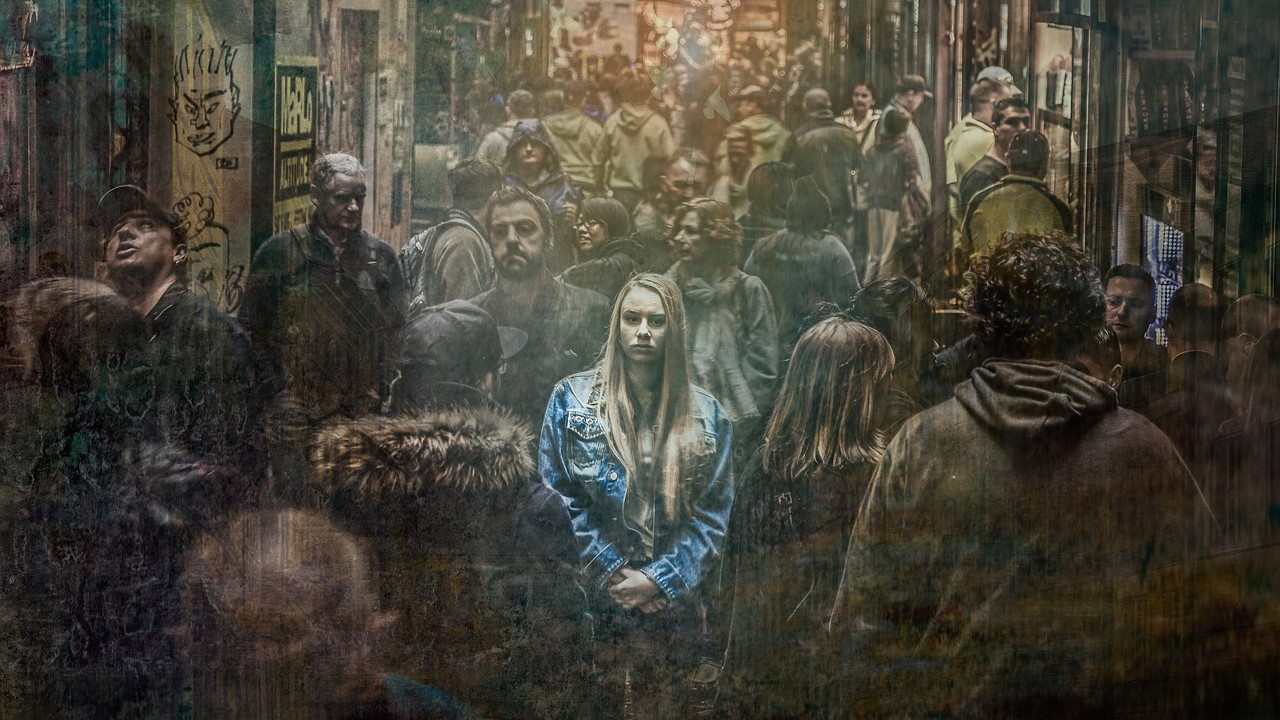All people have better and worse days. Some days, when you feel like the whole world is against you, you are glad that there is always a next day. When one is confronted by severe disease, losing a loved one, or being confronted with a massive failure on your end, at least you have a next day to look forward to. A potentiality for less suffering. What if you feel like the next day will not be any better and even potentially worse? This is what clinically depressed people often describe their experience as.
The Dawn of the Age of Depression
Depression has, especially in the West, become an increasing problem. According to the World Health Organization (WHO), it was even ranked the fourth leading cause of disability worldwide.[1] Since the late 1950s, depression as well as anxiety have been rapidly on the rise and have become the most common psychological problems. Therefore, our time has often been called ‘the age of anxiety and depression’. Even though depression rates have gone up globally, the Western world has seen unparalleled increases in depression. Lifetime prevalence estimates for clinical depression, also called Major Depression Disorder (MDD), are the highest in the United States with 16.9 percent of people effected.[2]
As the Swedish psychiatrist Olle Hagnell pointed out in her research, depression in the West is ten times more common than it was 50 years ago, even when one accounts for other factors. She concludes: ‘It now appears as if the prevalence of depression is reaching epidemic proportions.’ Accompanying this gigantic increase in depression, suicide rates have also skyrocketed, especially among young people. Luckily, in some Western countries like Norway, Finland, and Luxemburg, this has led to a greater awareness and help for people at risk.[3] Although it is a positive development that in some Western countries awareness and prevention of suicide have increased, the West still seems to be trapped in treating symptoms of cultural changes instead of addressing the root of these problems.
It is furthermore easily forgotten that clinical depression, including its darkest consequence, suicide, was quite rare in pre-modern societies. There were tough times which understandably depressed people occasionally, but it is crucially different from being clinically depressed in the face of prosperity. Therefore, the West needs more direction on how to restore a culture that is aware of and engages with its rich past to understand, implement and adjust to our time what worked in the past to lead us out of the age of depression. As Alexis de Tocqueville already predicted: ‘When the past no longer illuminates the future, the spirit walks in darkness.’ To understand where our culture has ‘gone wrong’, we should dive more into the cultural underpinnings of depression. But first, let’s observe the psychological understanding of depression so we understand what we are dealing with.
The Psychological Causes of Depression
Let’s start with the individual factors that have been associated with depression. First of all, there is a genetic component to how likely people are to get a clinical depression. Thus, some people are naturally more vulnerable for developing clinical depressions.[4] This has allowed some material reductionists, like the Dutch neurobiologist Dick Swaab, to claim that depression is primarily a biological problem. This view has been strengthened by the fact that antidepressants alter the body’s hormone balance and in doing so reduce depression symptoms. Yet, antidepressants over the last few decades have been proven highly ineffective in treating depression, let alone curing it. In my estimation, they therefore are more similar to the fictional drug Soma in Aldous Huxley’s Brave New World, suppressing the symptoms of suffering without addressing the actual causes of it.
To give the devil his due, there are actually some psychological factors that are telling of more fundamental causes of depression. First of all, there is ‘psychological individualism’. This theory focuses on negative ‘self-talk’ which causes problems like a lower self-esteem, social interest and motivation as well as an increased feeling of inadequacy and guilt. Additionally, depression is often explained by the ‘learned helplessness theory’.[5] This theory states that passivity and an experience of oneself as incapable of action create a lack of trust in one’s own potency and control. When adversities in life inevitably happen, people with learned helplessness become overwhelmed and ‘traumatized’ by live events, which makes them more vulnerable, thus they more easily develop clinical depression.
What both these theories have in common is that they rely on the internalization of negative emotions. Thus, depression is in its truest sense the opposite of expression. It is therefore not surprising that in our hyper individualistic culture, where people are stimulated to focus on their own experiences and emotions above all else, they become more often depressed.
‘When one looks at the wide variety of depression prevalence across cultures, it becomes clear that cultural factors are the key to solving the mystery of the age of depression’
In conclusion, although these different psychological theories and factors do explain how individuals become more vulnerable to develop clinical depression, they do not tell us why the prevalence of depression has exploded over the last 50 years. This fact exposes a glaring weakness in these different psychological approaches. Psychology itself has been heavily influenced by the modern and individualistic culture of our time. It therefore became blind to the cultural factors that shaped it and are crucial to understand the Western age of depression. Yet, when one looks at the wide variety of depression prevalence across cultures, it becomes clear that cultural factors are the key to solving the mystery of the age of depression.
The Western Culture of Depression
Western progressive culture has been the dominant global culture for a long period of time. Although with the rise of the multipolar world order, this cultural dominance is being challenged, many cultures around the globe have, to a bigger or lesser degree, become ‘Westernized’. Sometimes these influences are subtle. For example, many non-Western cultures didn’t have words to describe what we now would call clinical depression in the past. Over time, as more Western lingual concepts have been adopted by different cultures, that has changed and created the false assumption that clinical depression is a universal part of life.
Anthropological research disproves this assumption and demonstrates that clinical depression is not only not culturally universal, but that some cultures have little to no clinical depression and do not even have the words to describe the phenomenon.
A good example of such a culture is that of the Kaluli people in New Guinea.[6] They have been studied for decades with no documented cases of clinical depression. Kaluli culture is known for using externalization rituals for dealing with loss and adversity, which forms a sharp contrast to the internalization we find in the West. In Kaluli culture, major loss is followed by ritualized ceremonies whereby the victim is allowed to get ‘revenge’ and be compensated for their loss. These ceremonies are done mostly in group settings in which the ‘victim’ is expected to make displays of anger to get revenge against ‘the deities and evil spirits’ that are appointed as the external agent that is responsible for the hardship. If another person of the tribe is also deemed responsible for some of the loss, the victim needs to be compensated accordingly by this person as an act of reciprocity.
Another good example can be found in the analysis of postnatal depression which many mothers in the West face after childbirth. This in the West is mostly explained as a reaction to hormonal disequilibrium (the biological explanation), or by the fact that childbirth is a highly stressful event, which makes mothers who lack proper coping skills and are prone to stress more vulnerable to develop postnatal depression (the psychological explanation).
Yet, if we look for example at the Kipsigi people of Kenya, there is no postnatal depression to be found[7]. Kipsigi culture has many rituals that serve to magnify the importance of motherhood and giving birth. During this vulnerable period following giving birth, women get special attentions, gifts and rituals. Mothers during the first few months after giving birth are called Saloita. Other female relatives and close friends help the Saloita out during this period. After a few months, there is a greeting ceremony where the Saliota retransitions to their normal role as Kwondo or woman.
‘As young mothers in the West are left with an individual process that is detached from a larger community or cultural significance, so are all other people’
In the Western world, we do not have such traditions or ceremonies that are culturally shared besides maybe a baby shower. Moreover, Western culture teaches women to read endless books about their child’s development instead of relying on support from the environment. Once more, how we treat our new mothers exemplifies how Western culture deals with people in general. As young mothers in the West are left with an individual process that is detached from a larger community or cultural significance, so are all other people.
Modern Rage Versus Cultural Catharsis
These two examples do go hand in hand with the internalization models of depression that are prominent in Western psychology. In short, the lack of cultural and communal external expressions and importance has left Western people that are vulnerable to develop clinical depressions with a lack of options. Additionally, modern life with its endless focus on individual pride and self-respect has resulted in an epidemic of ‘modern rage’. Whereas in pre-modern Western culture pride and self-respect were derived from involvement in family, community, work and religion, individuals are nowadays left with nothing but their individualism and inner experiences to constantly satisfy their pride and self-respect. When this is insufficient, many people attempt to find their salvation and meaning in materialism and consumption, which have become the primary culturally accepted forms of meaning. In the pre-modern Western culture, on the other hand, negative emotions were more often absorbed in the collective identity, which protected individuals against severe emotional destabilization, in many ways similar to Kaluli rituals.
These unsatisfying options in our time are furthermore often fuelled by ideas of grandiosity and narcissism, which are used as coping and escaping mechanisms to withdraw in fantasies. These fantasies are the final convulsions of a culture that is failing its people. Inevitably these fantasies become self-destructive after a buildup of frustration and unresolved emotions, and so the age of depression is shaped. In conclusion, Western culture is no longer capable of equipping its people with sanctified ways of external expressions and catharsis, and has left people to drown in individualistic and internal distractions.
As Western culture has been trying to reinvent itself, the ‘cultural maps’ of the rich Western Judeo–Christian religious, local and national traditions and history have been hollowed out, replaced or even denied as valuable. The emotional regulation therefore nowadays demands self-conscious improvisation: being your own emotional therapist. Yet, as individuals have to deal with a constant information deficit, uncertainty lures around the corner on how to express negative emotions properly. This often leads to denying and/or inhibiting negative emotions.
The Consequences of Individualism
Even though people often long for social connectedness and cultural significance in their lives, it is nearly impossible to find these values. As conservative thinkers like Edmund Burke warned, complex social structures and traditions are built up over countless generations and cannot be easily restored with a quick fix. Especially as modern man is easily overwhelmed by adversity, which, with its tendency to internalize negative emotions, leads to self-blame, isolation, loneliness, guilt, and even existential despair. Not only does it lead to depression, but it also makes it very challenging to restore communities and cultural traditions.
Vulnerable people are the ones who in the end pay the highest price for this failure, as the elderly, psychiatric patients, people with disabilities, abuse victims, new mothers, heart surgery patients and stroke victims are the ones for whom these social networks are extremely important to prevent major depression and despair.[8] The power of social networks is furthermore demonstrated by the French sociologist Émile Durkheim. He points out that depression as a whole, including the ultimate act of depression, suicide, should not be understood merely as an individual act, but as a symptom of how integrated a culture is. Well-integrated cultures, which have strong cultural beliefs, codes of action, and social control mechanisms that prevent at-risk members from committing suicide are a strong protection against depression, while badly-integrated cultures show the opposite effect. What does this say about the state of our culture?
In conclusion, the age of depression in the West is one of the many symptoms of a culture that has become unbalanced and even destructive to many of its people. The great political philosopher Alexis De Tocqueville already warned us of the dangers of hyper individualism, a lack of social cohesion, and communities. As De Tocqueville laid out, modern democratic Western societies are no longer embedded in the old Greek and Christian virtues, which bound people to their culture and each other. Instead, people became increasingly focused on ‘productive behaviour’ based on more superficial morality, which people at large committed themselves to as this was beneficial for everyone, especially themselves.
‘The age of depression in the West is one of the many symptoms of a culture that has become unbalanced and even destructive’
As secularization and the breakdown of family and community life left people with even weaker ties to their culture, what has been left is a nihilistic and individualistic void. There have been many ‘quick-fixes’, oversimplified, and even outright destructive attempts to fill this void, of which ‘wokism’, ‘neoliberalism’ and ‘neo-conservatism’ are the most dominant at the moment. The chaos that has followed has left people in a loophole of what Tocqueville called individualism, but what I would better describe as egocentrism: ‘an innumerable multitude of men all equal and alike, incessantly endeavoring to procure the petty and paltry pleasures with which they glut their lives. Each of them, living apart, is as a stranger to the fate of all the rest—his children and his private friends constitute to him the whole of mankind; as for the rest of his fellow-citizens, he is close to them, but he sees them not—he touches them, but he feels them not; he exists but in himself and for himself alone; and if his kindred still remain to him, he may be said at any rate to have lost his country.’
The Western problem of depression, therefore, will not be solved by spending even more money on psychologists. It will take courage and bravery from those who are able to see past the clouds of distraction and have the capacity to speak out and be part of a new cultural elite, which paves the way for a culture in which cultural catharsis through cultural and social rituals and traditions are embedded in people’s family, community, national life and identity.
I know that it is tempting to look the other way, but while we are distracting ourselves with endless ‘possibilities’, consumption and material pleasure, we are only increasing the pain that we will have to endure later; or, as De Tocqueville describes it: ‘The advantages which freedom brings are only shown by length of time; and it is always easy to mistake the cause in which they originate. The advantages of equality are instantaneous, and they may constantly be traced from their source. Political liberty bestows exalted pleasures, from time to time, upon a certain number of citizens. Equality every day confers a number of small enjoyments on every man. The charms of equality are every instant felt, and are within the reach of all; the noblest hearts are not insensible to them, and the most vulgar souls exult in them. The passion which equality engenders must therefore be at once strong and general.’
[1] C J Murray, A D Lopez, ‘Evidence-based health policy—Lessons from the Global Burden of Disease Study’, Science, 1996, 274, 740–743, doi: 10.1126/science.274.5288.740.
[2] A Moussavi, S Chatterji, E Verdes, A Tandon, V Patel, B Ustun, ‘Depression, chronic diseases, and decrements in health: Results from the World Health Surveys’, Lancet, 2007, 370, 851–858, doi: 10.1016/S0140-6736(07)61415-9.
[3] J J Mann, C A Michel, R P Auerbac, ‘Improving Suicide Prevention Through Evidence-Based Strategies: A Systematic Review’, American Journal of Psychiatry, 178(7), 2021, 611–624, doi: 10.1176/appi.ajp.2020.20060864.
[4] P McGuffin, R Katz, S Watkins, J Rutherford, ‘A hospital-based twin registry study of heritability of DSM-IV unipolar depression’, Archives of General Psychiatry, 53, 1996, 129–136.
[5] L Y Abramson, G I Metalsky, C Vedak, ‘Hopelessness depression’, Psychological Review, 96, 1989, 358–372.
[6] E L Schieffelin, ‘The cultural analysis of depression affect: An example from New Guinea’, In A Kleinmann, B Good (Eds), Culture and depression, Berkeley, University of California Press, 1985.
[7] S Harkness, ‘The cultural mediation of postpartum depression’, Medical Anthropology Quarterly, 1, 1987, 194–209, p. 207.
[8] R Vilhjalmsson, ‘Life stress, social support and clinical depression’, Social Science and Medicine, 37, 1993, 331–342.
Related articles:







